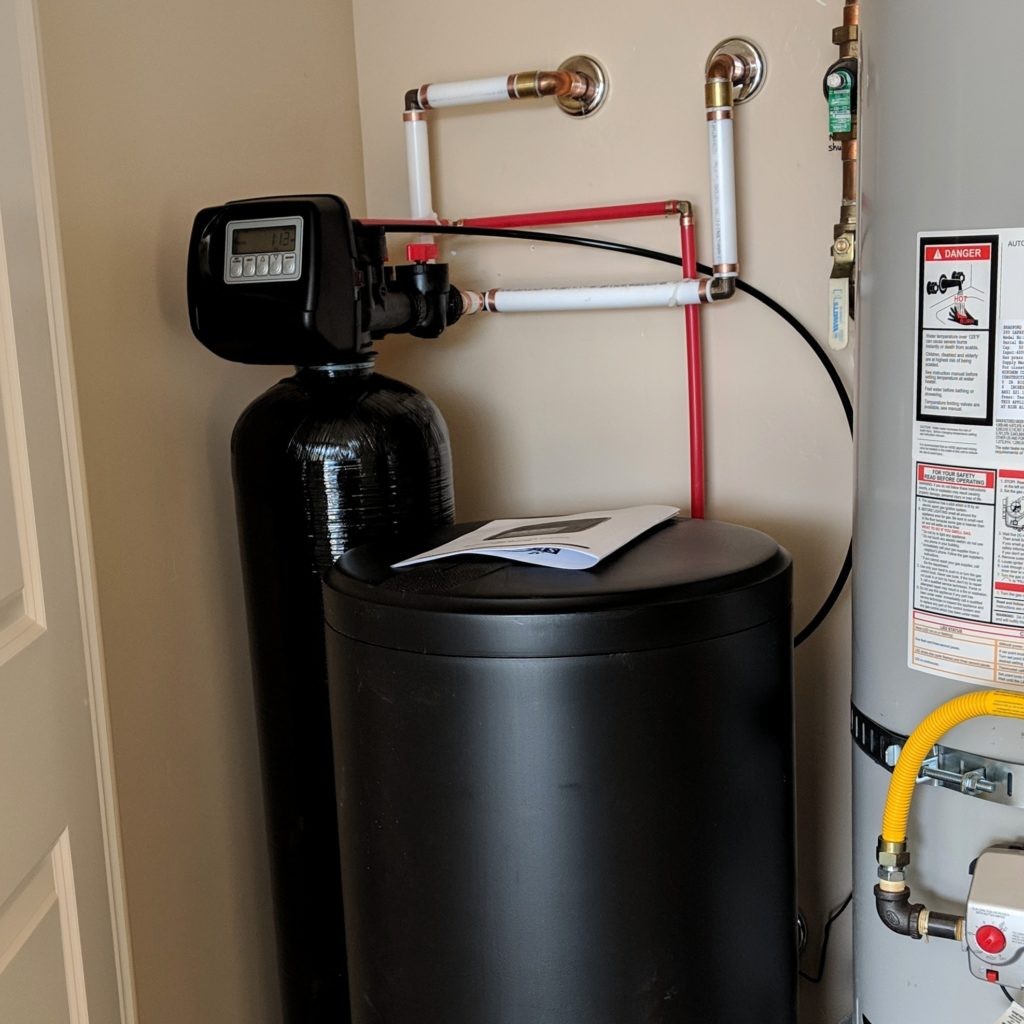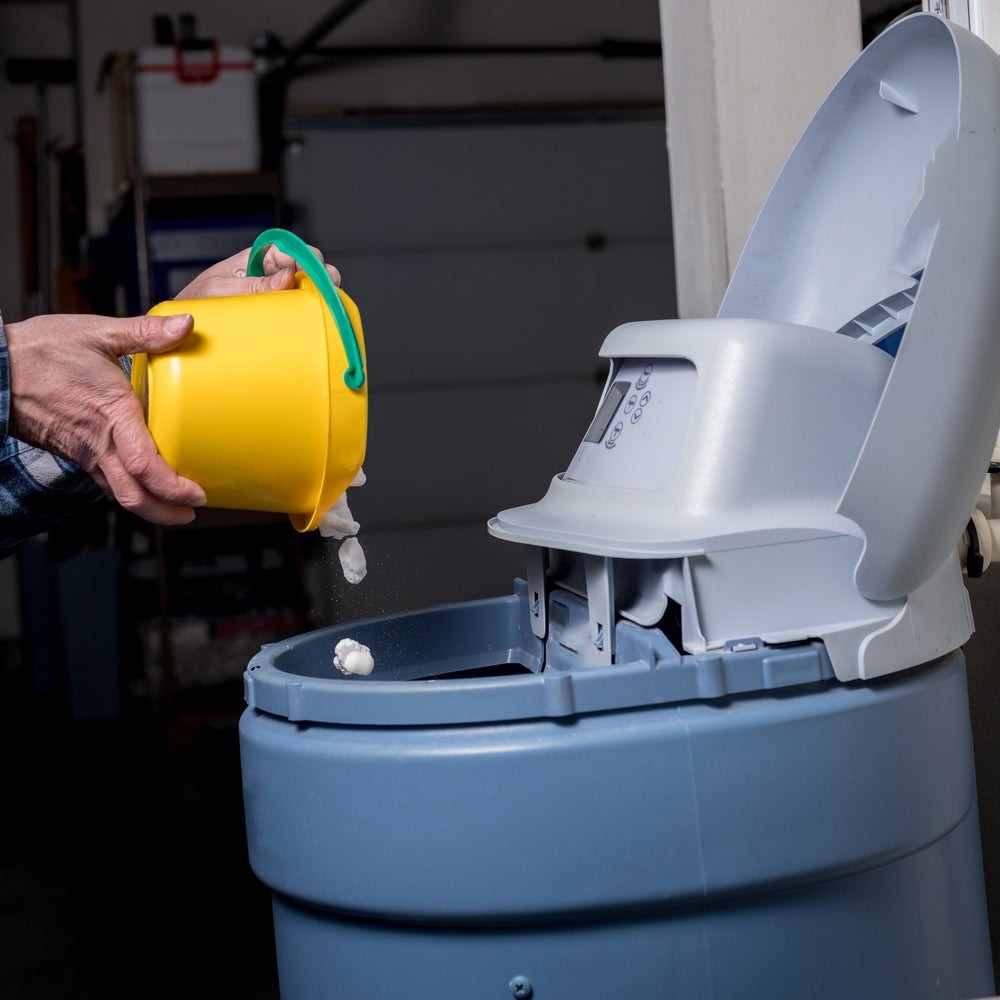How do I choose the right size and type of water softener for my home?
How do I choose the right size and type of water softener for my home? What are the benefits of having a water softener, and how does it work?
Subject: Plumbing - Sub Subject: Water softenerDate: 3/16/2023 Status: SOLVED
8 answered / 36 voted,
 866 viewed.
866 viewed.
 Sarah - Thursday, March 16, 2023 1141
Sarah - Thursday, March 16, 2023 1141How do I choose the right size and type of water softener for my home?

Choosing the right size and type of water softener for your home can depend on several factors, such as the size of your household, water usage patterns, and water hardness level. Here are some steps you can take to choose the right water softener:
- Determine your water hardness level: You can get a water hardness test kit from a local hardware store or have a professional water testing service test your water. This will help you determine the level of hardness in your water, which will inform the size and type of water softener you need.
- Calculate your water usage: Determine your daily water usage by adding up the number of gallons used per day by all household members. This will help you choose a water softener that can handle your household's water needs.
- Choose the right type of water softener: There are several types of water softeners, such as salt-based, salt-free, and magnetic. Salt-based water softeners are the most common and effective, but they require regular maintenance and use salt to regenerate. Salt-free and magnetic water softeners do not use salt but may not be as effective in reducing water hardness.
- Choose the right size of water softener: Water softeners are sized based on the grains of hardness they can remove before needing to regenerate. A professional plumber can help you determine the appropriate size of water softener for your household based on your water usage and hardness level.
- Consider additional features: Some water softeners come with additional features, such as a pre-filter or a timer. These features can help improve the efficiency and effectiveness of your water softener.
Choosing the right size and type of water softener for your home can help improve the quality of your water and reduce the negative effects of hard water on your plumbing and appliances. Consider consulting with a professional plumber to determine the best water softener for your household's needs.
What are the benefits of having a water softener, and how does it work?

Water softeners are devices that remove minerals like calcium and magnesium from hard water, and replace them with sodium ions. Here are some benefits of having a water softener:
- Better quality of water: Softened water feels smoother and cleaner, and can reduce the negative effects of hard water on your skin, hair, and clothes.
- Longer lifespan of plumbing and appliances: Hard water can cause mineral buildup and corrosion in plumbing and appliances, which can reduce their lifespan. Soft water can help prevent these issues and extend the life of your plumbing and appliances.
- Reduced energy consumption: Hard water can cause buildup in water heaters and other appliances, which can reduce their energy efficiency. Soft water can help prevent this buildup and reduce energy consumption.
- Reduced cleaning time and costs: Soft water can reduce the amount of soap and cleaning products needed, and can make cleaning tasks easier and more efficient.
So how does a water softener work? Most water softeners use a process called ion exchange to remove minerals from hard water. Water is passed through a resin bed in the water softener, which is coated with small resin beads that are charged with sodium ions. As the hard water passes through the resin bed, the calcium and magnesium ions are exchanged for the sodium ions, and the softened water is then sent to the household's plumbing system. The resin bed must be periodically regenerated with a brine solution that flushes out the accumulated minerals and recharges the resin beads with sodium ions.
Overall, a water softener can provide many benefits for your household's water quality, plumbing, appliances, and energy consumption. Consult with a professional plumber to determine if a water softener is right for your home.
 The best Reply
The best ReplyANSWERS Write an Answer
❝How do I choose the right size and type of water softener for my home?❞ answers. JACOB-AK asked first. Total 8 replies.
Hint: Salinas, CA?
 0
0 0
0Must visit Mesquite, TX?
 0
0 0
0🛪 Shreveport, LA?
 0
0 0
0 0
0 0
0 0
0 0
0 0
0 0
0 0
0 0
0- Water softener size selection
- Home water softener type
- Choosing the right water softener
- Residential water softener sizing
- Water softener capacity
- Water softener system selection
- Home water treatment solutions
- Water softener technology options
- Household water softening needs
- Water softener efficiency
- Water softener grain capacity
- Water softener regeneration cycle
- Sizing water softeners for homes
- Water softener salt requirements
- Water softener system options
- Whole house water softener
- Water softener for well water
- Selecting a water softener unit
- Water softener for large households
- Eco-friendly water softener
- Water softener maintenance
- Water softener cost considerations
- Water softener installation guidelines
- Hard water treatment solutions
- Water softener brands and models
- Water softener comparison
- Water softener sizing calculator
- Water softener for city water
- Water hardness levels
- Water softener buying tips
- Water softener installation requirements
Similar Questions
What is the best method for repairing a leaking washing machine hose without calling a professional plumber?
Learn how to fix a leaking washing machine hose yourself with these DIY methods. Save time and money by following these easy steps at home.
/ Washing machine hose repair Answers: 0 297
297
What are the signs that indicate it's time to replace an aging water heating system?
Signs like reduced hot water supply, strange noises, leaks, and higher utility bills indicate it's time to replace an aging water heating system.
/ Age of water heating system Answers: 0 330
330
What are some important steps to take in preparing your home and garden for winter freezes to prevent damage and ensure survival of plants?
Protect your home and garden from winter freezes by taking important steps like insulating pipes, covering delicate plants, and using mulch to prevent damage and ensure plant survival.
/ Preparing for winter freezes Answers: 0 414
414
How can pressure relief valve problems in a system be identified and rectified before they lead to potential safety hazards or equipment failures?
Learn how to detect and fix pressure relief valve issues in a system to prevent safety risks and equipment failures. Stay proactive and ensure system efficiency.
/ Pressure relief valve problems Answers: 0 264
264
What steps should you take to winterize your plumbing to prevent frozen pipes and potential damage during frigid temperatures?
Learn how to protect your plumbing from freezing temperatures this winter. Follow these steps to prevent frozen pipes and costly damage to your home.
/ Winterizing your plumbing Answers: 0 350
350
What are the best methods for repairing a leaking washing machine hose to prevent potential flooding and water damage?
Learn how to effectively repair a leaking washing machine hose to avoid flooding and water damage. Follow these tips to fix the issue and protect your home.
/ Washing machine hose repair Answers: 0 303
303
What are the best methods for repairing a leaking washing machine hose to prevent potential flooding and water damage?
Learn how to effectively repair a leaking washing machine hose to avoid flooding and water damage. Follow these tips to fix the issue and protect your home.
/ Washing machine hose repair Answers: 0 369
369
What are common signs of malfunction in a gas or electric heating element, and what steps can be taken to troubleshoot and repair the issue?
Discover common signs of malfunction in gas or electric heating elements, and learn how to troubleshoot and repair the issue effectively.
/ Gas or electric heating element problems Answers: 0 393
393
What are some effective ways to prevent and handle frozen plumbing during the winter months?
Learn how to prevent frozen plumbing during winter by insulating pipes, keeping faucets dripping, and using heat tape. Act quickly if pipes freeze to avoid costly damage.
/ Dealing with frozen plumbing Answers: 0 341
341
What are some effective methods for protecting pipes from freezing during cold weather to prevent costly damage and repairs?
Protect your pipes from freezing in cold weather with insulation, heat tape, and letting faucets drip. Prevent costly repairs by taking proactive measures.
/ Cold weather pipe protection Answers: 0 252
252
Similar Articles
Plumber, Plumbing System, Master Plumber
Plumbing SystemPlumbing is any system that conveys fluids for a wide range of applications. Plumbing uses pipes, valves, plumbing fixtures, tanks, and
 79
79Expert San Francisco Plumbing Repair Services for Your Home
When it comes to plumbing repair in the vibrant city of San Francisco, you need a team of professionals who are more than just your typical plumbers.
 117
117Dealing with a Leaking Toilet Tank: A Comprehensive Guide
Dealing with a Leaking Toilet Tank: A Comprehensive Guide A leaking toilet tank can be a persistent and bothersome issue that not only wastes water b
 104
104
